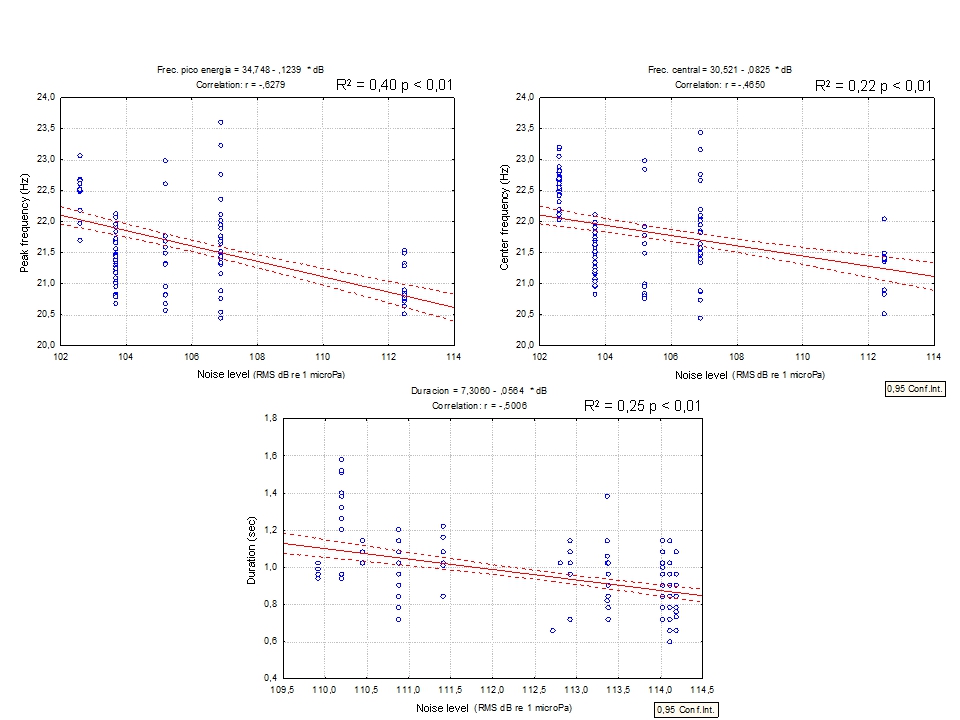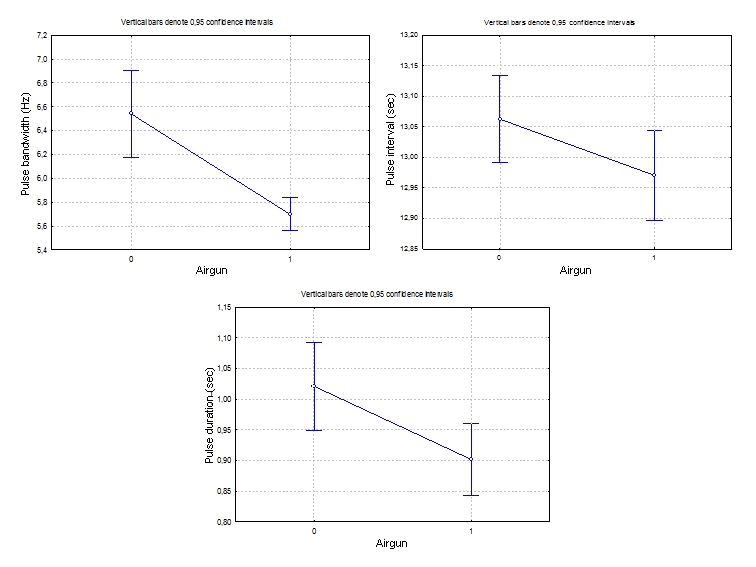Human-made Noises
Make Mediterranean Fin Whales Modify Their Behavior
Manuel Castellote - manuel.castellote@noaa.gov
National Marine Mammal
Laboratory, Alaska Fisheries Science Center/NOAA
Seattle, Washington
Christopher W. Clark
Bioacoustics Research
Program, Cornell Lab, Cornell University
Ithaca, New York
Marc O. Lammers
Hawaii Institute of
Marine Biology
Kaneohe, Hawaii
Popular version of paper
1aAB8
Presented Monday
morning, April 19, 2010
159th ASA Meeting,
Baltimore, MD
Noise from human activities in the ocean can interfere with fin whale
communication. This a matter of concern for the scientific community studying
the potential negative effect of noise to marine fauna. Fin whales emit sounds
in the very low frequency range, where noise from shipping and other human
activities is intense.
This study shows how fin whales in the Mediterranean Sea modify their
acoustic behavior in noisier areas or during noisier times of the day. Their
vocalizations tend to decrease in frequency and become shorter in duration and
more repetitive (Fig. 1). This change in the acoustic behavior is interpreted
as a compensation mechanism to avoid the interference from noise on their
communication.

Figure 1. Regression analysis of ambient noise levels
and several acoustic parameters measured in fin whale vocalizations. Results
show a highly significant correlation, with a decrease of the acoustic
parameters when noise levels increase.
Only male fin whales sing, and singing is more vigorous during winter
months, when mating is believed to occur. Therefore, the most plausible
hypothesis is that fin whale songs are related to mating behavior. If a male
modifies his singing behavior as a result of increased ambient noise levels
from human activities, this interference has the potential to affect his
reproduction success. This is of particular concern for populations of fin
whales in areas with intense commercial ship traffic and high noise, such as
the Mediterranean Sea.
The increase of noise from commercial ship traffic has the potential to
negatively affect fin whale survival, first by decreasing the range over which
males can be heard by competing males and receptive females, second by forcing
males to sing louder and longer and therein expend more energy than normal, and
third by decreasing the effectiveness of their songs if they are shifted into
different frequency and temporal patterns.
Exploration surveys for oil and gas are one of the noisiest human
activities made in the marine environment. These surveys produce intense,
low-frequency impulses to penetrate the seafloor. Our results show that fin
whales changed the features of their songs in the presence of noise from
geophysical surveys (Fig. 2) and abandoned the area by moving away from the
noise sources and out of our detection area for a time period that extended well beyond the
duration of the geophysical survey (Fig. 3). This study provides evidence that fin whales modify their acoustic
behavior to compensate for increased ambient noise and that under some
conditions will leave an area for an extended period.

Figure 2. Average values of acoustic parameters measured
in fin whale vocalizations in the absence (0) and presence (1) of noise from
the geophysical survey.

Figure 3. Received bearings to fin whale songs in the
study area and in which impulses from a distant geophysical exploration survey
were detected. Bearings increase at the onset (December 8th) of the geophysical
survey indicating that whales moved away from the noise source and out of our
detection area. Fin whales did not come back to the study area until January 1st,
17 days after the survey ended, and slowly came back into the original area.
Results from this study can be explained by fin whales having two different
types of reactions to noise. The first one is observed in the presence of commercial
ship noise and is manifested as habituation to a continuous noise source, spatially
predictable (ships usually navigate through shipping lanes) and that gradually
increased over the last 50 years. The second type of reaction is a
sensitization process to the geophysical survey noise, which could become intense
enough to generate physiological damage if the whale gets too close to the
noise source and that is recurrently present in the Mediterranean Basin.
Both the chronic negative impacts of habituation and the acute impacts
of sensitization have the potential to negatively affect the survival of fin
whales. Neither noise from commercial shipping nor geophysical surveying is
currently regulated. Both activities are occurring in a global and increased manner
in the oceans.
Fin whales are arguably the most sensitive species to shipping and
seismic noise in the Mediterranean Sea. The Mediterranean population is at a
disadvantage compared to other fin whale populations because of the intensive
whaling occurred near the Strait of Gibraltar in the recent past, because of
the high isolation situation for the Mediterranean population and because the
intense human pressure over their ecosystem. Results from the present challenge
to reduce, control and regulate noise in the Mediterranean Sea will be for sure
an example to follow or to avoid in other oceanic basins where human pressure
is less compressed and ecological consequences of this contaminant will take a
bit longer to be evident.